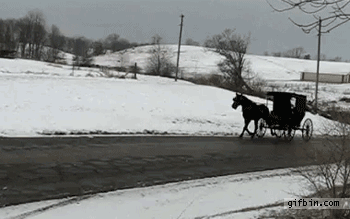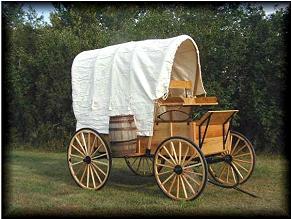WHEN YOUR WAGON BROKE DOWN:
A Slight Digression Having Nothing At All
To Do With Poetry
Let's face it: your brand new conestoga wagon
(pictured at right) wasn't going to retain its "New
Wagon Smell" for long . . . not when it was being
pulled by horses or oxen. And the "roads" back
then weren't the best either, being little little more
than dusty, rutted paths through the American
outback. They could break your wooden wheels
and axles in a heartbeat.
(To get an idea of their appearance you can check out Wikipedia . . . or, just drive around Virginia's roads that have suffered from decades of neglect because of a General Assembly intent on impressing voters by never raising taxes to attend to the public infrastructure. But we digress.)
When your covered wagon broke down, what were you going to do? America was sparsely settled back then. The nearest AAMCO repair shop was over a hundred miles away and nearly as many years.
Not to worry! The makers of the first conestoga wagons were intrepid Mennonites and Amish living in Conestoga Township in what is now Lancaster County, Pennsylvania. They were nothing if not practical. Anticipating breakdowns . . . many of their first wagons took settlers down through Virginia's Appalachian Valley on roads similar to our own today . . . they fitted them out with large, heavy brass bells. Yep, bells.
If the wagon broke down, the driver would ring the bell long and loud. With good luck, some farmer might hear the bell and come to their rescue. But how to express gratitude for such costly kindness? The custom developed that, if the rescuers got you repaired and safely back on your way, they got to have your bell.
As a result, many farms and ranches today have those conestoga wagon bells hanging above their entry roads.
One more thing: it helped to be an optimist if you were travelling great distances over uncertain roads. The expression, "We'll be there with bells on!" expressed that optimism.
Those of us living in Northern Virginia use it a lot . . . swallow hard . . . keep our fingers crossed . . . and MapQuest the nearest AAMCO locations as we set out on our journeys.
Lest you think that the foregoing is something we made up, we heard it from an Amish tour guide in Lancaster County, Pennsylvania.
And you can always trust the Amish . . . they're so practical . . . so inventive . . .
so . . .



